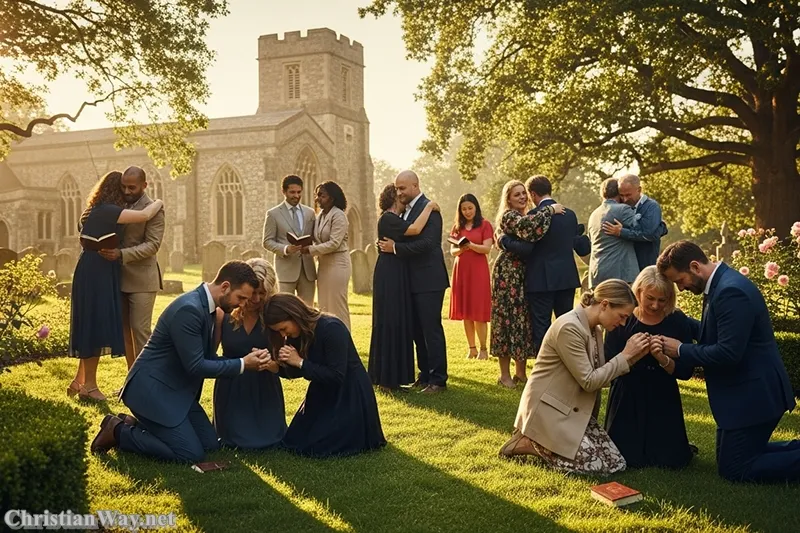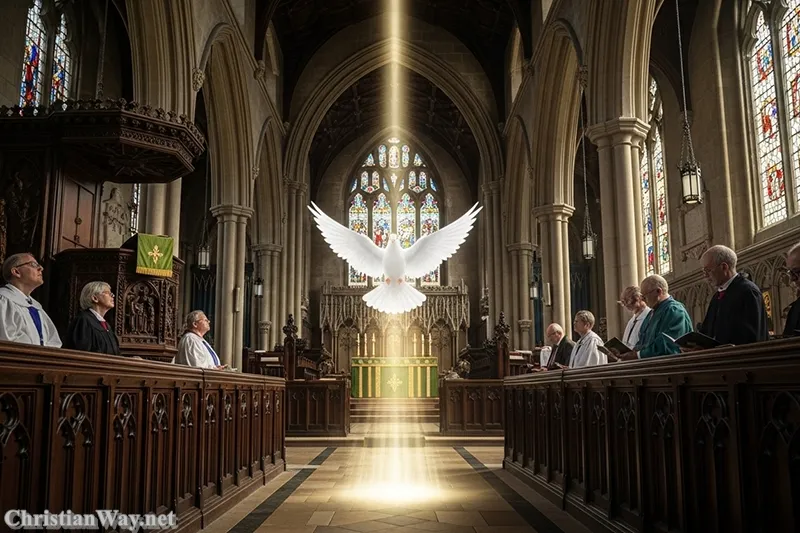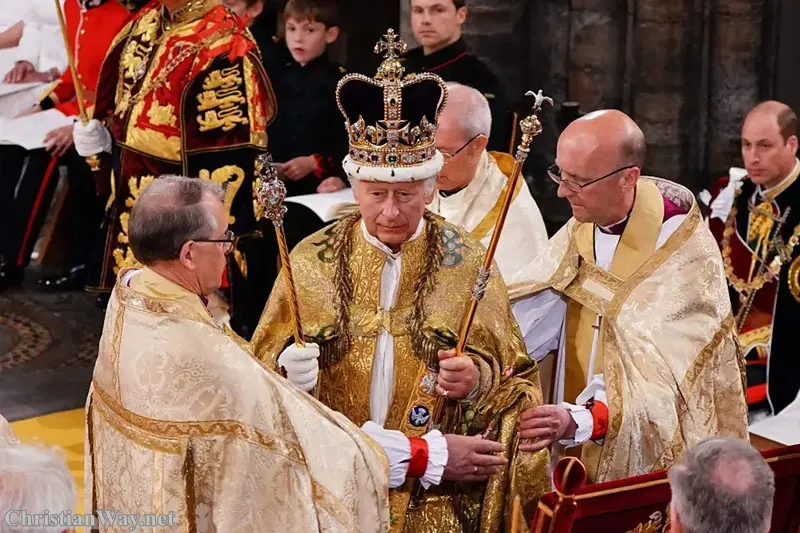Dear friends in Christ,
Every community that gathers in the name of Jesus carries both the beauty and the burden of human life — the longing to love, and the need to be forgiven. In the Anglican tradition, these two movements of the heart — love and reconciliation — are not abstract doctrines or moral obligations; they are the living rhythm of the Gospel expressed in prayer, liturgy, and daily faith.
Love is the heartbeat of Anglican spirituality, echoing the words of our Lord: “You shall love the Lord your God with all your heart, and your neighbor as yourself.” (Luke 10:27). Reconciliation, in turn, is love made visible — love that crosses division, heals what is broken, and restores the communion that sin and pride have torn apart. Together they form the soul of Anglican life: a people called not simply to believe, but to live in the grace of God’s reconciling love.
The Call to Love: Rooted in the Gospel
At the center of Anglican practice stands the command of Christ to love. The Scriptures remind us again and again that love is the measure of true discipleship: “By this everyone will know that you are my disciples, if you have love for one another.” (John 13:35). This is not sentimental affection or mere tolerance, but an active charity that seeks the good of the other — even when it demands sacrifice.

Anglican worship, especially in the Book of Common Prayer, places love at the heart of every service. Each Eucharist begins with the summary of the Law: love of God and neighbor. Every confession and absolution leads us back into communion — not only with God, but with one another. The prayers of the people lift up the world in love, binding together the faithful in a shared intercession that knows no boundaries of nation, creed, or class.
Love in Anglican life is not limited to the church walls. It extends to the home, the workplace, and society at large. The Anglican ideal of the “via media” — the middle way — arises not from compromise, but from charity: the desire to remain united even amid diversity, to hold truth and grace together without breaking fellowship.
The Work of Reconciliation: Healing in Christ
Reconciliation is where love meets the real wounds of human life. It is the practical expression of grace that heals division, whether between individuals, communities, or within the heart of a single believer.
In Anglican sacramental life, reconciliation takes form most clearly in the Sacrament of Confession, often called “Reconciliation of a Penitent.” The phrase itself reveals the heart of Anglican theology: confession is not about guilt alone, but about being reconciled — restored to the fullness of love. The priest speaks words of absolution not as judge, but as a minister of Christ’s mercy, declaring that what has been broken can be made whole again.
This ministry of reconciliation flows outward from the altar into the world. In the Eucharist, we are reconciled to God and to one another; as we receive the Body of Christ, we become His Body — a living sign of divine forgiveness. The Anglican liturgy constantly reminds us that reconciliation is both a gift and a calling: “Forgive us our trespasses, as we forgive those who trespass against us.”
The Cross: The Meeting Place of Love and Reconciliation
At the center of all Christian faith stands the Cross — the eternal meeting point of divine love and human sin. In Anglican spirituality, the Cross is not only an event to be remembered but a mystery to be lived.
Christ’s sacrifice reveals that reconciliation is not achieved by force or negotiation, but by love that is willing to suffer. St. Paul writes, “God was in Christ reconciling the world to Himself, not counting their trespasses against them.” (2 Corinthians 5:19). This truth permeates Anglican worship, especially in the Eucharistic prayer, where Christ’s one oblation of Himself is remembered and made present anew.
The Cross invites us to live as a reconciled people — to forgive those who hurt us, to seek peace where there is conflict, and to offer our lives as instruments of grace. Every Anglican parish, no matter its size or setting, is called to be a small reflection of Calvary: a place where love overcomes hostility, and where all are welcome to begin again.
Community and Communion: The Shape of Anglican Love
Anglicanism, by its very nature, is communal. It understands the Church as a fellowship of believers bound together by prayer, Scripture, and sacrament. Love and reconciliation are not private feelings but communal realities — lived out in shared worship and mutual care.
The parish system itself expresses this incarnational love. Every church is responsible not only for its members but for everyone within its geographical bounds. This means that Anglican love is inherently missionary and pastoral — it seeks to reach every soul with the compassion of Christ.
When conflicts arise, as they inevitably do, Anglican tradition calls the community not to separation but to dialogue, patience, and prayer. The processes of reconciliation within the Communion — whether between individuals or provinces — reflect the belief that unity is not the absence of difference, but the triumph of love over division.
The Book of Common Prayer: A School of Love
One of the greatest treasures of Anglicanism is the Book of Common Prayer, a collection of prayers, psalms, and liturgies that has formed Christian hearts for centuries. It teaches love not through argument, but through rhythm and repetition — through words that shape the soul into gentleness and gratitude.
In its daily offices, we find the constant reminder of God’s mercy: morning by morning, evening by evening, the prayers turn us toward grace. The confession of sin, the assurance of pardon, the intercession for the world — all of these mold us into a people of reconciliation.
Even the language of the Prayer Book, dignified yet tender, reflects this love. Its phrases — “whose service is perfect freedom,” “the peace of God which passeth all understanding,” and “we are not worthy so much as to gather up the crumbs under thy Table” — teach humility, compassion, and hope. The more one prays them, the more the heart becomes attuned to the love of Christ.
Forgiveness in Practice: From Liturgy to Life
The challenge of Christian life lies not only in believing in forgiveness but in living it. Anglican spirituality insists that reconciliation must shape how we treat others daily — in the home, in the parish, and in society.
In the family, reconciliation means patient listening, humility, and the willingness to start anew. In the parish, it means addressing conflicts with prayer and honesty, not resentment. In the wider world, it means advocating for peace and justice, especially for the poor and oppressed.
Many Anglican communities express this through ministries of healing, counseling, and social service. The work of reconciliation is not merely personal but also social — healing divisions of race, class, and nation. The Church’s mission is to reflect God’s kingdom, where mercy triumphs over judgment, and where every person is seen as a beloved child of God.
The Eucharist: The Feast of Love and Peace
In Anglican worship, the Eucharist is the supreme sign of love and reconciliation. Before approaching the altar, the faithful are invited to exchange the Peace — not as a mere greeting, but as a sacramental act. It is a moment when the body of believers enacts Christ’s command: “If you are offering your gift at the altar, and there remember that your brother has something against you, leave your gift there… first be reconciled to your brother.” (Matthew 5:23–24).
The sharing of the Peace is a sign that we cannot receive Christ’s Body while refusing to love His members. When we partake of the Eucharist, we enter into the mystery of divine love made flesh — and in that moment, all divisions are meant to be healed. The bread and wine are not only gifts; they are the means by which we become one body in Christ.
The Anglican Witness in the World
Anglicanism, as a global communion, bears witness to love and reconciliation not only in word but in its very structure. It is a fellowship of diverse peoples and traditions — English, African, Asian, American — united in the love of Christ.
Despite theological and cultural differences, the Communion remains committed to the belief that unity in Christ is deeper than uniformity of opinion. The Lambeth Conferences, dialogues between provinces, and ecumenical partnerships all testify to this mission of reconciliation. The Anglican Church seeks not to conquer but to converse, not to dominate but to serve.
Through hospitals, schools, missions, and acts of compassion, Anglican Christians around the world continue the ministry of the reconciling Christ — bringing light into dark places, and peace into troubled hearts.
Reflect and Pray
Dear friends, love and reconciliation are not optional virtues; they are the very essence of the Christian life. To love is to know God, for “God is love.” (1 John 4:8). To forgive is to share in the very heart of Christ, who prayed from the Cross, “Father, forgive them.”
Let us, then, renew our hearts in this calling — to love beyond comfort, to forgive beyond fairness, and to live as ministers of reconciliation in a divided world. Every act of mercy, every word of kindness, every prayer for peace draws us closer to the Kingdom where all things are made new.
May our worship, our communities, and our daily lives bear witness to that divine love which alone can reconcile the human heart.
May the peace of God, which passes all understanding, guard your hearts and minds in Christ Jesus, and may His reconciling love flow through you into all the world.
— Fr. John Matthew, for Christian Way





